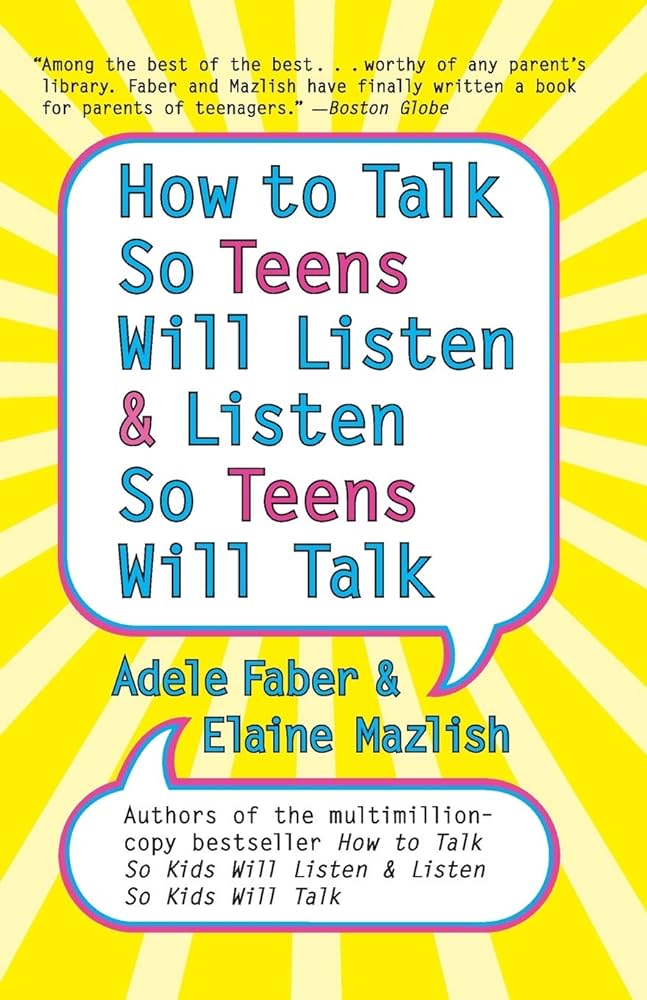
One of the most important skills in parenting teens is effectively navigating parent-teen communications. That’s why our October book club pick is “How to Talk So Teens Will Listen and Listen So Teens Will Talk” by Adele Faber and Elaine Mazlish. These authors are also parents. There are many iterations of these books because parenting strategies in these books works — they are effective and proven!
Adele and Elaine use examples from their own lives as well as stories from parents that they had worked with over the years.
“It gets harder as kids get older and it is even more difficult today than it was when we were raising kids,”
This book is filled with straightforward advice and written in their trademark, down-to-earth style sure to appeal to both parents and teens, this all-new volume offers both innovative, easy-to-implement suggestions and proven techniques to build the foundation for lasting relationships. From curfews and cliques to sex and drugs, it gives parents the tools to help their children safely navigate the often stormy years of adolescence.
“How can I express my honest feelings in a way that will make it possible for the other person to hear me and even consider what I have to say?”
– Elaine Mazlish

Faber & Mazlish’s Approach Unique
- Do not advocate for punishment or time-outs. These are teachable moments rather than punishment.
- Emphasize listening, describing and validating emotions
- Encouraging autonomy and involving teens in problem solving
- Focuses on tone conveyed: “You are a lovable, capable person. Right now, there’s a problem that needs attention. Once you’re aware of it, you’ll probably respond responsibly.”
Helping child deal with their child deal with their feelings. Treat children in distress same as if they are physically injured — they are injured emotionally.
- Listen with full attention… using “Hmm” and “Oh”… LET THEM TALK!
- Acknowledge their feelings with a word… “It sounds like…”
- Giving a name to their feelings, keep in mind, anger is a secondary emotions.
- Giving child’s wishes in fantasy
Amazing Quick Reminders
- Acknowledge Your Teen’s feelings: Identify thoughts and feelings, Acknowledge feelings with a word or sound, Give into fantasy of what they can’t give in in reality, accept feelings as you redirect behavior.
- Engage a Teenager’s Cooperation: Describe problem, describe what you feel, give information, offer a choice, say it in a word, stat your values and/or expectations, do the unexpected, put it in writing.
- Alternatives to Punishment: State your feelings, state your expectations, offer a choice, show how to make amends, take action.
- Working it out Together: Invite your teen to give their point of view, State your point of view, Invite your teenager to brainstorm with you.
- Feelings Need to be Acknowledged: Acknowledge feelings with a sound or words, Identify feelings, Give in fantasy what you can’t give in reality.
Talking between Teens & Parents
Expressing Irritation
To your Teenager: Say what you feel, Say what you’d like and/or expect
To Parents: Say what you feel, Say what you’d like and/or expect
Expressing Appreciation
To your Teenager: Describe what they did, describe what you feel
To your Parents: Describe what they did, describe what you feel.
Our Key Points
- Feelings matter. Not just your own, but those of people with whom you disagree.
- Civility matters. Anger can be expressed without insult.
- Words matter. What you choose to say can cause resentment or generate goodwill.
- Punishment has no place in a caring relationship. We’re all people in process—capable of making mistakes and capable of facing our mistakes and making amends.
- Our differences need not defeat us. Problems that seem insoluble can yield to respectful listening, creativity, and persistence.
- We all need to feel valued. Not only for who we are now, but for who we can become.